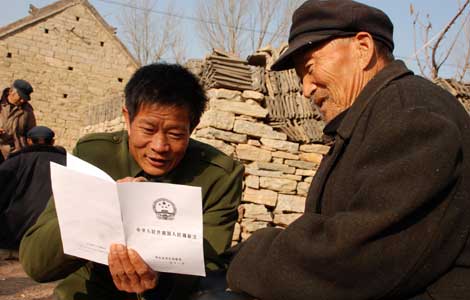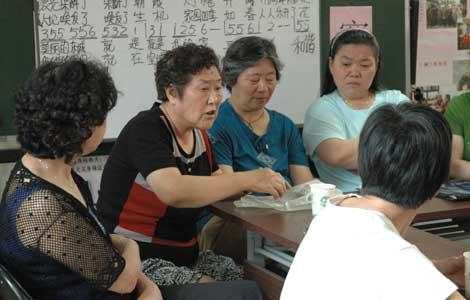Society
Playing peacemaker
Updated: 2011-06-27 07:52
By Liu Xin (China Daily)
 More than 820,000 mediation committees have been established to help solve civil disputes in both urban and rural communities around the country. Liu Mingxiang / Asia News Photo |
|
 Feng Jinqiao (left), a community mediator for 20 years, shares her story with other mediators and residents in Dongcheng district, Beijing. Liu Xin / China Features |
Community mediators have long played a key role in maintaining peace in Chinese neighborhoods. Liu Xin with China Features reports.
Chen Yong's 15-year marriage was becoming shaky as he and his wife, surnamed Si, fought constantly.
"She is too controlling," complained Chen, a businessman in his 30s from Jiangxi province.
"I just don't want him to waste money," retorted Si. "A man with money will misbehave."
Chen staged many walkouts, leaving Si in doubt about his affections for her.
They did not want a divorce, however, so they turned to a community mediator.
After hearing both sides, the mediator, Hu Jianyun, convinced Si to give her husband more space and Chen to be more sensitive to his wife's feelings.
The couple signed an agreement promising to keep their parts of the bargain and to communicate openly at the first sign of trouble.
From resolving conflicts over the division of property after a divorce, to the intrusion of a neighbor's dog on private property, mediators have played a role in civil disputes for over half a century.
Chinese law allows for such agreements to be put to the courts for confirmation. Once the agreements are approved by the court, they will have the force of law.
Rather than resorting to litigation within a formal court system, most disputes are settled informally through community mediation.
At a recent gathering of some 60 mediators in Beijing's Dongcheng district, 71-year-old Feng Jinqiao says, "Our work would become much easier if all organizations took their work more seriously."
A monthly affair organized by the district's Zhonggu community, the meeting allows residents to exchange ideas and share their personal stories with the mediators.
Feng has been a mediator in her community for 20 years, ever since she retired from Shougang Group, an iron and steel company.
Her work is not always easy, Feng says. Mediators must maintain neighborly relations while trying to solve disputes between residents.
She says she is most often approached to step in to resolve family disputes and arguments between neighbors.
There are more than 820,000 mediation committees in the country, established and managed by urban neighborhood or rural village committees.
Passed in August 2010, China's law on community mediation states that litigants have the right to employ the services of mediators to solve disputes, and that these litigants can accept or refuse mediation at any time.
Ran Cuiwei, an official of Jingshan community in Beijing's Dongcheng district, says that more than 80 percent of the community's mediators are chosen by residents.
"They are volunteers who want to serve their neighbors," Ran says.
Many of them are retired police officers, factory managers or teachers.
The judicial bureau of Dongcheng district says that of the 23,540 disputes that have been referred to date in 2011, 22,801 have successfully been resolved through mediation.
Ran recalls one case in which a resident added a balcony to the second floor of his home, infringing on his neighbor's privacy.
"The neighbor said that everything that happened in his house could be seen from the balcony," Ran says.
While the construction of the balcony did not violate the law, mediators intervened in the case and persuaded the resident to remove it.
However, there are occasionally cases where mediation does not work.
Before the establishment of the monthly seminars in Zhonggu community, Feng spoke to a woman who wished to reclaim expenditures incurred over the course of her marriage, which she was in the process of dissolving.
"I had to admit that my knowledge of property disputes was weak," Feng says.
Judge Jia Yuhui, who attended the seminar, explained that the woman would have a hard time reclaiming her money if she couldn't come up with evidence to support her claims, such as receipts for loans granted to her ex-husband.
"It couldn't be confirmed whether the husband spent the loan money before they got married or not," Jia says. "Post-nuptial property is owned by both sides."
Feng says she hopes to improve her knowledge of such legalities.
"People involved in these kinds of disputes may very well know more about the law than I do. My mediation isn't always convincing enough," she says.
Li Liping, director of the judicial bureau of Dongcheng district says, "As the first channel through which civil disputes are solved, mediation helps save the country's judicial resources."
Xu Yiqun, a lawyer from the southern city of Shenzhen in Guangdong province, says mediators help save valuable time and money.
"The aim of mediation is to stop small disputes from turning into bigger ones."
Xu admits that some people are more likely to accept the suggestions of mediators because of their ties to local communities, but also says that their lack of legal knowledge can become a handicap.
"However, in comparison to more complicated and time-consuming legal procedures, mediation is still adequate for safeguarding the lawful rights and interests of civil litigants," Xu says.
Ran says that some disputes in her community have been solved in less than two hours. Civil disputes can and do crop up all the time, and it would be impossible and unnecessary to solve all of these through judicial process.
Ran believes the mediators and the courts have two distinct functions.
"Mediators aim to defuse resentment and hostility in communities, whereas the court's job is to decide who is right and wrong and give out penalties," Ran says.
Mediators have, at times, appealed to municipal inspectors to resolve civil disputes.
"Being more tough, inspectors can help maintain harmonious communities," Ran says.
Beijing has begun to distribute subsidies to mediation committees. The mediation committees of every community in Dongcheng district receive 20,000 yuan ($3,100) per year in subsidies.
"The money is used to buy small gifts for our mediators at the end of the year," Ran says.
Feng's devotion to mediation is, however, not fully understood and supported by her family.
"My daughter is trying to persuade me to live with her ," she says. "But I just want to stay with my neighbors and help them."

Specials

Premier Wen's European Visit
Premier Wen visits Hungary, Britain and Germany June 24-28.

My China story
Foreign readers are invited to share your China stories.

Singing up a revolution
Welshman makes a good living with songs that recall the fervor of China's New Beginning.